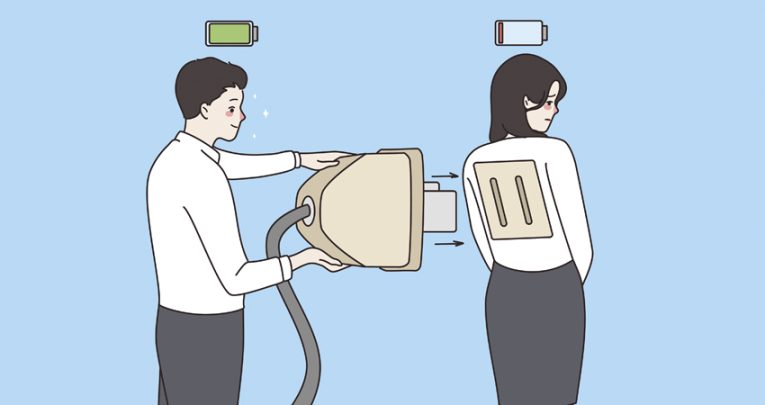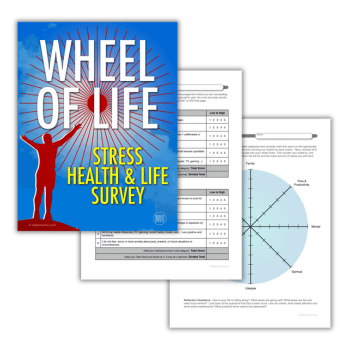Teacher wellbeing – How to go from exhausted to empowered

We explore practical strategies for self-care to equip you with the tools you need to prioritise and elevate your wellbeing…

- by Teachwire
- Classroom expertise and free resources for teachers

We explore different aspects of teacher wellbeing, from self-care to looking out for your colleagues…
How to keep teaching from taking over your personal space

A good work-life balance can be hard to attain, concedes Adam Riches – but we all need to ensure the job doesn’t crowd out our personal space…
From the very first day I started training to be a teacher, I realised that working in education was going to be intense.
Although I had, and always have had a good work ethic, it never really made sense to me that teaching entailed so much more than what was stated in the job description. I suppose the irony is that from day one, I knew that the actual teaching bit of being a teacher accounts for only a fraction of the job – the tip of the proverbial iceberg.
Taking over
Striking a work/life balance as a teacher is no mean feat. The sands are always shifting, and it feels like there’s never enough time in the day. Be it planning, preparing, building on subject knowledge, sorting and attending CPD and other duties, there’s a fine line between what we’re able to do at school and what ends up spilling over into our wider lives.
Of course, there are many professions where you can expect to take work home with you at some point – but for many, teaching is a way of life. And if you’re not careful, it can take over your life.
Key to controlling the impact teaching has on your life is to avoid the creep. Each year, we all start in September with grand promises to ourselves that ‘We’re only going to so much at home…’ Come mid-October, the reality is very different.
The pressure makes us feel that we need to do that little bit more. Engaging in some extra planning, getting that data in, logging those detentions – but what can we do to make sure we’re effective and efficient at our jobs, without losing our actual lives?
Strip it back
If we’re honest with ourselves, there are some things in schools that we have to do, and some things we think or feel we should do. Often, the former can become clouded by the latter, causing our efficiency to take a hit.
The process of sifting through everything that’s landed with you, and then simply cancelling out the white noise is a crucial part of workload reduction. It’s this that will eventually lead to a much better work/life balance. Just because somebody else is doing something we’re not, that doesn’t mean we need to change what we’re doing.
It’s so important to be both self-aware and to not be led by others, whether they happen to be people in your department, school or on social media. Why? Because that way, you won’t be piling unnecessary pressure on yourself.
Self-evaluate
It’s natural to compare ourselves to others in similar professional roles, but trying to emulate others is something that teachers can often fall into, causing them to internalise a perceived need for perpetual, endlessly cycling self-improviement.
When you look at your practice, you need to ask ‘What works for me?’ and ‘What works for my students?’ (or indeed team, if you’re in a leadership role). Be self-evaluative of your own teaching, and accept when something isn’t working.
One of the biggest contributors to workload is attempting to implement something that simply isn’t working for you. Doing so will only end up consuming your time, sapping your energy and creating yet more stress. Sure, be proactive in instigating change if it’s needed, but remember – if things are working well, observe the old phrase, ‘If it ain’t broke, don’t try and fix it’.
If you’re already getting good results and your students are progressing well, then focus on making those small tweaks. Try to forget about those resources that somebody spent 9,000 hours making and boasting about on X.
Realistic routines
Establishing a routine is crucial to striking a good work/life balance (or re-establishing one, if you feel things have started to slip). Prioritising those aspects of your life outside school should come first, as well as your wellbeing. Then you can start thinking about how to fit your job and professional responsibilities in around the time you have.
It may be that you go into school earlier, or perhaps stay a bit later a couple of days a week. You might decide to work a set amount of time at home in a specific window. Whatever form this routine takes, be sure to stick to it and be realistic. If you can be honest about how much there is to be done, it’s much more likely that the routine will become established and embedded within your day-to-day life.
Part of this may involve factoring in those parts of your day that you need as an actual human being. A ritual of consuming your hot or cold beverage of choice should be in there somewhere. Some time dedicated to simply decompressing should feature as well – however busy or chaotic your school day might be.
It’s these things that will have the most psychological impact on you over the course of your day (well, those and that particularly wild Y8 class). It therefore follows that they will impact upon your time at home as well. Take your wellbeing in school seriously, and prioritise it. Because doing so will significantly reduce your stress levels once you get home.
Clear expectations
We’ve touched on it slightly up to now, but distinguishing between those tasks you have to do and those you don’t is a hugely important part of being a teaching professional.
There will be some tasks you can’t challenge, since you’ll be contractually obliged to do them as part of your professional duties or within your set working hours. That said, you can and should issue a challenge if you think that what’s being asked of you goes beyond your contract, to the point of impacting upon your work/life balance.
Much of the time, there can be a degree of vagueness around expectations. I think things have improved a bit in recent years, but you can still encounter some very specific, yet unwritten rules in certain schools. Challenging these is important, unless it’s directed time, as there should be no restrictions on when you can come in or leave school.
Being informed doesn’t mean you’re planning anarchy. Knowing what’s part of your job role and what isn’t is vital if you’re to keep your work/life balance in check. Having this knowledge will help you plan your time and allow you to prepare accordingly – which is surely not too much to ask.
Creating a culture
Your work/life balance can be directly correlated to the culture of the school you work in, but here’s the thing – you are a key part of defining that culture.
I’m not saying you should be refusing to do things to improve your work/life balance. Equally, however, it’s important that staff don’t apply pressure to each other. Whether done intentionally or unintentionally, this can be a real problem that tips the scales.
Being a part of a positive culture that champions wellbeing and challenges inefficient ideas is the dream for all of us. Yet without action, it will never become a reality. At an individual level, it’s our own attitude that will define both our own workload and that of our colleagues.
It can be difficult to take a step back when in the heat of the moment – especially when things move at the pace they do in teaching. Addressing your work/life balance and making it sustainable means having
to examine the very foundations of what you’re doing at school, and asking yourself the question – ‘Do I need to do this?’
Adam Riches is a teacher, education consultant and writer. Download a teacher burnout self-evaluation worksheet.
The care you can provide to colleagues (and vice versa)

What kind of daily support are you and your colleagues experiencing from each other, asks Charlotte Lander – and is it enough?
Working in a school means we’re surrounded by others on a day-to-day basis. Yet the proximity of our colleagues, and the familiarity of our pupils, doesn’t mean there won’t be times when we feel alone.
In whichever capacity we work with students, our roles require an element of performance. As teachers, this is most often in the form of presenting – but there are also times when we must mask our own needs to better serve the students we aim to make a difference for.
Given the daily emotional and physical demands involved in running a school, the people best placed to offer support are often those in the trenches alongside us.
Feeling connected
The act of asking for support can be harder than it sounds, though – especially when we’ve worked in education for many years. We spend our days urging students to ask for help if and when they need it, but then see it as a sign of defeat when we do the same ourselves.
Often, the greatest resource available to us is the team we belong to. Some colleagues will have entered teaching after pursuing careers in completely different fields. Others might have held various roles within education before eventually finding the post that’s right for them. The fact is, we all bring something unique to the table.
But with more demands and less time, those casual reminders you hear regarding the importance of ‘wellbeing’ and ‘finding a good work-life balance’ aren’t always as helpful as they aim to be. Instead, ask your line manager how they manage their wellbeing, and which techniques have worked well for them.
Then ask your colleagues how they go about compartmentalising and striving for that elusive ‘work-life balance’. Ask the teacher in the classroom next door what strategies they use to deal with challenging behaviour, and if you can observe them. They’ll feel glad that you asked them.
Ultimately, the people around us will all, at some point in their careers, have experienced similar feelings. Someone with years of experience under their belt may still be trying to figure it out even now, despite conveying the illusion that they have everything under control.
We know that our colleagues will have tried, tested, succeeded and failed, but still managed to get back up on their feet again. And this is why they can offer us the most relatable, honest and unfiltered advice out there, perhaps more so than any educational book.
Types of support
The types of support we may find ourselves in search of – and equally, feel able to give – will naturally vary. For those in the earlier stages of their career, or who might have recently joined a new school, the support they require will usually be of an informative and practical kind. Be it through a formal feedback process or via a quick question posed in the corridor, they will be on a constant search for answers, wisdom and experience.
They may, for example, be seeking advice on challenging behaviour, or be keen to get a second pair of eyes on their seating plan from the teacher who taught their class last year. In many cases, support can be more effective when delivered through tangible solutions.
Broadly speaking, there are times when the support we seek will extend beyond the comfort of our workplace. In some ways, the advice we can access online feels easier to take on board because it’s depersonalised. In this digital age, social media groups give us a sense of community.
Powerful validation
Though our contexts may vary, we can find ourselves brought together with people who are in the same boat as us. Online discussion forums can similarly serve as a valuable source of ideas and reassurance, coupled with a level of anonymity that enables us to take greater risks when asking all those silly questions.
Sometimes, the support we need won’t necessarily arrive in the form of an answer. Instead, it can come through recognition and acknowledgement – that which many of us are hesitant to ask for. I’m not saying we all need a pat on the back for every lesson we teach – but it is worth remembering how good it feels to hear someone else tell us, ‘You’ve got this,’ or ‘I like that idea – I’m going to try that in my lesson.’
We mustn’t overlook the power that comes from recognising and validating the skills and talents of those around us. If you hear a good word spoken about a colleague, make sure to tell them.
Sharing best practice
The Teaching and Learning International Survey (TALIS 2013) found that teachers who participate in collaborative practices have higher job satisfaction and report greater self-efficacy.
As such, many schools and colleges have adopted collaborative approaches to CPD, which can include implementing professional learning communities (PLCs). These allow educators to discuss various teaching and learning strategies, and share feedback on how these have been implemented.
This not only helps create opportunities to share best practice on a regular basis, but also fosters a culture of togetherness, where we can all learn from each other.
That said, it’s worth additionally reflecting on how we, as professionals, go about utilising such opportunities for collaboration. On-the-job experience is valuable, but if we typically respond to suggestions in development meetings with a ‘This has never worked before’, or a less than helpful ‘…but they behave for me,’ attitude, we can risk diminishing the willingness of others to openly share or ask for support.
Yes, blunt comments delivered from a place of experience may well bear some truth, but will offer little in the way of empathy. If professional dialogue is to be supportive, then it should seek to understand, advise or offer a solution.
Being mindful
Our days can feel rushed, and any spare minute can feel like gold dust – but that’s why it’s vital that we check in with those around us. It can take a little while for new members of staff to fit into an already established team. For trainee and early career teachers, moving to their second teaching placement can feel like starting all over again.
Even when there are plenty of people on hand to offer support in the practical sense, just joining in with the staff room conversations can be tricky to navigate. Irrespective of our individual roles, making a conscious effort to acknowledge the trainees and ECTs in our school – be it a friendly hello in the corridor, or popping your head round their door at lunch to make sure they’re taking a break – will ensure they’re not left on the outside looking in.
Finally, get involved with the wellbeing activities your school organises. If none are on offer, team up with colleagues who share similar interests and plan an activity that focuses on staff wellness. These needn’t be limited to the confines of work, of course – if anything, scheduling these kinds of activities outside school can actually make it easier for people to maintain that all-important work/life balance.
Maybe organise a book club and set a new location for each meetup. Get a group of people together and take part in a local weekend park run. Whatever form it ends up taking, a school community should always be grounded in colleagues coming together and rooting for one another.
Charlotte Lander is a teacher of English and psychology, and specialist in Talk for Learning.
Keeping well in winter

How a child’s comment led teacher James Pearce to realise the importance of keeping well in the winter months...
Trending
It was a Friday afternoon in January of my first year in the classroom when a child suggested I could be the Transylvanian terror. Charming!
I know we get our fair share of judgements and opinions from our pupils (good and bad ones about our fashion sense, hair style and choice of activity) but this one seemed a little harsh. I hadn’t sucked all the fun out of that day’s maths lesson (no Count Dracula puns, please…) and I hadn’t recoiled from the garlic bread at lunchtime.
The truth was, this pupil’s thoughts was merely reflecting my comment that I hadn’t seen the daylight all week.
Seasonal affective disorder
While my writing and advice is usually aimed at ECTs and those thinking of joining us on the frontline, I believe it’s important that we all get an annual reminder that the short days can be tough.
In fact, looking at the news before Christmas, even singer Adele was highlighting that SAD (seasonal affective disorder) is something that can affect any of us.
The NHS website’s page on SAD is interesting reading when it comes to what happens when we lack sunlight. We produce more of the sleepy melatonin hormone and less serotonin, which affects our mood, appetite and sleep. Yes, we actually have an excuse for the irritability, a lack of energy and the cravings for carbohydrates!
Keeping motivated
Thinking back to the NQT me (as I was then), I recall finding it hard to keep as motivated and just felt a little low.
Of course, being naive and new, I didn’t want to talk about it with others. It wasn’t until the pupil who should not be named made their throwaway comment that I realised something might be wrong.
Chatting with colleagues and my mentor, I realised that I wasn’t the only one. We were all finding our heads filled with ‘February fog’.
We’d all focused on keeping well in the countdown to Christmas, popping echinacea tablets like they were chocolates and making the most of social occasions to keep ourselves merry, but a new year brought new challenges.
It was reassuring to know I wasn’t the only one. As my years in teaching have ticked by, I see the same cycle happening year on year. I’ve mentored and worked with more ECTs than I care to admit during my decade and a bit so far and I would say 90% of them had the same symptoms I did.
So, how do we make the change and brighten up our winter wellbeing?
Advice for staying well
It’s all about remembering that we aren’t teaching machines. ‘Eat, sleep, teach, repeat’ does not a happy, healthy or effective teacher make!
Through the spinning plates of meetings, assessments, planning, marking and the actual teaching, it’s vital that you take time for yourself and see some sunshine. It sounds like a cheesy health resort or a rehab facility for school staff, I know, but it’s true.
I suppose you could say that our ‘sunshine’ isn’t always the same as another person’s. For me, one of life’s greatest pleasures is when I am out and about on a winter’s day and I need to put on my sunglasses. It could be a crisp walk out in the winter sun with the scarf and shades combo or even a break duty where I can see my shadow on the tarmac. It’s the little things, eh?
For others, their sunshine might be heading out for a daily walk around the block at lunchtime or a few quick breaks outside of the school grounds during the day.
Whatever your vice, ask yourself where you can find the time in your week to feel the sun. Do you really need to be in at the crack of dawn every morning or leave as the caretaker locks doors behind you at night?
Do you make the most of the weekends as a chance to break out of the four walls? Are you being efficient with your time and prioritising your winter wellbeing?
Ask yourself those questions and have a good think about how you can integrate some time into your daily or weekly schedule. I promise you’ll feel better for it (although my medical qualifications don’t extend much past an ice pack!).
Keeping an eye on others
One other thing for you to think about is keeping an eye on your colleagues. I’ve written this for us as teachers but TAs, HLTAs, office staff, kitchen staff and anyone else in your school community could be suffering the same fate.
A few of my family members spent their years managing and cooking in school kitchens. Working 6am to 3pm every day didn’t leave a lot of time for sunlight in the winter.
Your TAs might go home at lunchtime but are they off home to sit in the garden or are they off to another job that keeps them inside?
One of the best things about our industry is that we are a community and we look out for each other. Never be afraid to ask if someone needs help if you see those SAD symptoms. You could just make someone’s day, week or winter!
Tips and tricks for winter wellbeing
- Find opportunities to get outside in the school day. Break duties are a super chance to see daylight and local trips with your class can be a blessing in disguise during the dark months. You could also head out for lunch to gain some steps and sunlight. Some of my best teaching friendships came about from weekly walks to the local bakery!
- Take some vitamins. I developed a vitamin D deficiency during my early years in the classroom so I swear by vitamin D along with multivitamins in the winter months. Check with your doctor or pharmacist first though.
- Aim to get out before sunset at least one day a week. Set yourself a 4pm deadline to be out of the building to get some sunshine. If you’re lucky enough to be able to, walk home or park your car a little way away – more steps and sunshine!
- Think about your wellbeing outside of work. As tempting as it is to have a cosy weekend, motivate yourself to enjoy some sunshine and get out for some fresh air at least once on your days off.
- Remember each day is getting that little bit longer. The winter months can be tough but from December 21st, the only way is up. Enjoy those few minutes a day and look forward to the clocks changing!
James Pearce is the author of Do You Want to Share That With the Class? Honest Advice and Hilarious Anecdotes for Primary ECTs.
Why students need good content AND rested teachers
Colin Foster explains why being properly prepared for a class involves more than just having a brilliant lesson plan…
Imagine a teacher who is facing a demanding lesson the following day. It might be Friday afternoon with an often challenging class. Additionally, there may be rainy and windy weather forecast – which, as every teacher knows, is the worst possible combination.
On top of that, the content is something students always find challenging. And, to be completely honest, it’s not even the teacher’s favourite topic.
Chances are, this teacher will spend their Thursday evening doing lots and lots of preparation. Despite what some politicians may say, it’s extremely rare to find a lazy teacher. Teachers will habitually expend vast quantities of their supposedly free time on getting ready for school the following day.
And thus, our teacher will stay up into the early hours, scouring the internet for the best resources they can find. They’ll be thinking about, re-thinking (and perhaps overthinking) what they’ll be doing, minute to minute.
This teacher will plan, and then re-plan, and then tweak and improve until they eventually have an all-singing, all-dancing lesson ready to meet the next day’s challenges. One that’s sure to make the lesson go smoothly and facilitate a positive, rather than negative learning experience.
Running on empty
What transpires the following day is an order of events that many of us will have gone through ourselves. The teacher wakes up tired and grumpy from lack of sleep. Having spent their precious evening (and a hefty chunk of sleep time) hard at work on their preparation, they’re simply not operating at their best come the following afternoon. Yes, the lesson is fully prepared. The teacher is not.
Oh, they know their stuff and they’ve done their homework, all right – but that’s precisely the problem. An exhausted teacher is never best placed for handling a challenging lesson or class.
Our teacher finds it hard to think quickly. Their judgment calls aren’t as good as they might be. They’re slow to respond to difficulties, and the lesson ends up embodying all of the teacher’s worst fears.
Teacher wellbeing matters too
Teachers can be very selfless people. They know perfectly well that they could earn more money for less effort engaged in some other profession. But they care about young people and believe that education matters.
Teachers want students to get the best possible start in life. To that end they’re committed to giving something back by playing their part in that. Where the children are concerned, it can sometimes seem as though no sacrifice is too much. As we hear so often, children only get one chance at their education,.
No teacher wants to be a hypocrite, challenging students during the day about the effort they’re putting in and demanding punctual returns of homework, only to then not do those same things themselves as part of their job. Schools exist for students, not for teachers – ergo, we must put students at the centre of everything.
Yet while some of those sentiments might be true, they can combine to create a toxic work environment for teachers. Of course, schools should put students and their learning at the centre of all that they do. But teachers matter too.
Schools are more than just learning environments for students. They’re also workplaces for both teaching and non-teaching staff, and their levels of wellbeing matter as well.
What’s unhelpful is seeing ‘teacher wellbeing’ presented as being in competition with students’ best interests. The question of ‘Who matters more – the students or the teachers?’ presents a false choice, since exhausted, demoralised teachers are never going to be in students’ best interests either.
Preparation in the round
In a sense, there was very much a lack of preparation ahead of that difficult lesson. The paperwork may have all been in order, and the lesson’s technicalities expertly considered – but conspicuously absent was any form of emotional preparation on the part of the teacher.
Teaching is an emotionally demanding, often draining occupation and virtually impossible to do well when running on empty. It’s not a selfish act for a teacher to prioritise their own wellbeing and sanity. Rather, we should view it as something that is beneficial for everyone.
Preparing ‘the teacher’ is just as important – perhaps even more so – than what we might traditionally view as preparing ‘the lesson’.
In practice, this ‘teacher preparation’ might involve visiting the gym, or relaxing with family and friends. Far from being trivial, spending time in this way contributes to important emotional preparation for the demands of the day ahead.
In an ideal world, all teachers would be able to complete the entirety of their paperwork by the end of the day. They’d then be able to head home and enjoy an evening of entertainment and/or restful social downtime.
Unrealistic aspiration
In reality, this can seem an unrealistic aspiration for many, calling for some hard choices. Is it wise to go in with a ‘good enough’ lesson plan, after an evening spent relaxing and an early night? Or better to produce a stellar lesson plan that’s then delivered by a stressed and worn-out teacher the following day?
There may be no right or wrong answers here – but seeing emotional preparation as being of equal importance to content preparation might at least start to redress a balance that’s tipped too far in one direction.
If we continue to prioritise short-term goals (the quality of the next day’s lesson) over long-term teacher wellbeing, then we shouldn’t be surprised if the rate of teachers leaving the profession continues to rise, to the point that it becomes no longer possible to provide ‘schooling’ in the sense we’ve become accustomed to.
Teacher wellbeing and common sense
The process of teaching draws on a complex package of skills and requirements. Teachers are never just preparing for ‘a lesson’ or even several lessons; we’re preparing to be around young people, with all the challenges and opportunities this presents.
Depending on the subject, some teachers may find lesson content emotionally charged and draining to teach. In some instances, we might need to work at being in an emotionally healthy place ourselves before being able to do a good job of that.
More broadly, however, we simply don’t know when a student will suddenly come to us with a personal question or problem they want to talk about. We’ll often say that teachers should always be available to be approached about anything – but do we perform the requisite work/rest on ourselves in order to prepare us for that?
Being as well-rested and refreshed as possible (even if that means making hard compromises with respect to lesson preparedness) will stand us in good stead to be maximally useful.
Even if it’s just taking some common sense steps to look after our own emotional wellbeing, we’ll be better role models and more supportive and helpful adults when students approach us – for whatever reason that may be.
Colin Foster (@colinfoster77) is a Reader in Mathematics Education in the Department of Mathematics Education at Loughborough University and has written numerous books and articles for mathematics teachers; for more information, visit foster77.co.uk.










